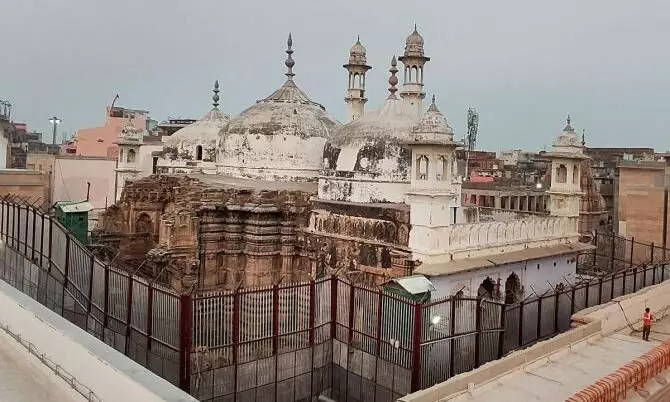
Allahabad HC considers Hindu side's plea for worship in the Gyanvapi Mosque
text_fieldsThe Allahabad High Court observed that the Places of Worship Act does not bar the Hindu side’s petition for permission to worship at the Gyanvapi mosque to dismiss the Muslim side’s petition on Tuesday.
The case revolves around the Gyanvapi mosque, situated adjacent to the iconic Kashi Vishwanath temple in Varanasi. Two separate writ petitions were filed by the Gyanvapi mosque committee, known as the Anjuman Intezamia Masjid Committee, and the Uttar Pradesh Sunni Central Waqf Board.
The petitions challenged the maintainability of a suit filed in 1991 before the Varanasi court on behalf of the deity Adi Vishveswar Virajman. The suit sought control of the disputed premises and permission for worship.
The Muslim side contended that the 1991 suit was not maintainable under the Places of Worship Act (Special Provisions) Act of 1991, which restricts altering the character of religious places as it existed on August 15, 1947.
However, the petitioners of the 1991 suit argued that the Gyanvapi dispute predates Independence and, therefore, falls outside the scope of the Places of Worship Act.
The Allahabad High Court's decision, handed down by Justice Rohit Ranjan Agarwal, implies that the legal proceedings regarding the Gyanvapi dispute can proceed without being hindered by the Places of Worship Act.
The court further directed the Varanasi district court to conclude the hearing in the Gyanvapi cases within six months, marking a timeline for the resolution of the contentious issue.
Advocate Hari Shankar Jain, representing the Hindu side, revealed that the court emphasized the need for evidence to establish whether the existing structure is a mosque or a temple. This assertion underscores the court's commitment to a thorough examination of the facts before reaching a final decision.
The Gyanvapi case has been a focal point of tension and legal battles for years, with multiple petitions and challenges filed by both the Hindu and Muslim sides. The Allahabad High Court's recent ruling adds a new chapter to the complex narrative, setting the stage for intensified legal proceedings in the coming months.























